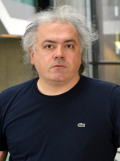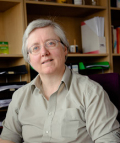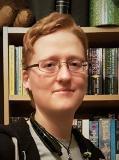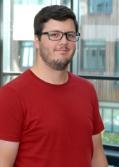
Non-Standard Computing Research Group
The group develops and investigates a range of novel computational models
Our work includes quantum, neural, reservoir, analogue, and mechanical computing, and novel hardware and computational substrates such as Field Programmable Gate Arrays (FPGAs), magnetic materials and meta-materials.
Contact us

Professor Susan Stepney
Non-Standard Computing Research Group lead
We develop and investigate a range of novel computational models that complement the classical Turing/von Neumann approach used in your laptop and smartphone. For example, we research quantum computing (using the power of quantum physics to solve certain problems faster), neural networks (inspired by how the brain works), and mechanical computing (using microscopic levers, rods, and gears to compute).
We use novel hardware, such as FPGAs, a highly configurable and parallel computer chip, to simulate these novel models efficiently.
We work with Material Scientists to develop novel non-silicon-based forms of computational material, such as magnetic materials, and meta-materials (materials patterned and engineered to have specific properties), to provide physical devices that naturally support these novel computational models, rather than needing to simulate them with conventional silicon.
We aim to develop novel computers that can work using much lower power, in environments hostile to conventional electronics (such as in the body, underwater, in space), or with much greater sensitivity, for a new generation of “smart” devices.
The group develops and investigates a range of novel computational models (for example: quantum, neural, reservoir, analogue, and mechanical computing) and novel hardware and computational substrates (for example, FPGAs, magnetic materials, meta-materials). The aims are (i) to understand what computation is, and what the physical constraints on computation are, at a fundamental level; (ii) to develop novel models and cutting-edge devices better suited to particular applications (for example, low power edge computing, high sensitivity quantum sensing).
- Theoretical computer science – new models of computation
- Philosophy of computing – deeper understanding of computation, and the relationship between abstract models and physical implementations
- Quantum technologies, quantum sensors – more powerful computers, more sensitive devices
- Materials science – engineering metamaterials for computational properties
- Embodied computation – combining computation and materials in a symbiotic relationship
Stories
Group members
| Photo | Contact details |
|---|---|
| Academic staff | |
 |
Academic staff |
 |
Academic staff |
 |
Academic staff |
 |
Academic staff |
 |
Academic staff - group lead |
| Research staff | |
 |
Research Associate |
 |
Research Assistant |
| Postgraduate research students | |
 |
Rafael Afonso Rodrigues Postgraduate Research Student |
 |
Reem Alqifari Postgraduate Research Student |
 |
Jonathan Edwards Postgraduate Research Student |
 |
Jess Park Postgraduate Research Student |
 |
Mohammed Terry-Jack Postgraduate Research Student |
 |
Riv Waldegrave Postgraduate Research Student |
 |
Chester Wringe Postgraduate Research Student |
 |
Matt Young Postgraduate Research Student |
| Other affiliates | |
 |
Tian Gan Affiliate |
 |
Rinku Sebastian Affiliate |
 |
Affiliate |
Contact us

Professor Susan Stepney
Non-Standard Computing Research Group lead